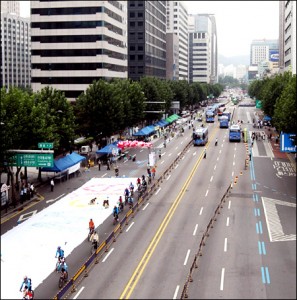Whereas some cities with car-free programs have gone to the extreme of banning cars on a particular day or observing a day with a token campaign, Seoul’s version of this program – called the Weekly No Driving Day Program – has incorporated incentive measures. Originally proposed by an NGO in July 2003, the program’s operational and incentive measures include the following:
Citizens voluntarily choose one day among weekdays as a no driving day (0700 to 2200 hours) except on weekends and public holidays; Participants receive a set of e-tags and stickers; and Incentive measures to participants are provided by the public as well as the private sector (non-commercial vehicles carrying less than 10 passengers are eligible) as shown below:
Incentives (Public sector):
- 5 per cent reduction in auto-tax
- 50 per cent discount on congestion charge
- 10-20 per cent discount on public parking fees
Incentives (private sector):
- 1-6 percent discount on gasoline price
- 10 percent discount on car maintenance cost
- Free or discount on car washes
Results
- a participant rate of 30 per cent;
- a decrease in traffic volume of 7 per cent;
- an increase in operating speed of 13 per cent;
- a reduction in emissions of 12 per cent;
- a reduction of particular matter (PM) of 10: 3.5 mg/m^3; and
- an annual fuel cost saving of US$600 million
Lessons
- Financial incentive measures work better than a sole reliance on voluntary action;
- IT/Internet use facilitated car users’ registering the choice of a day not to drive and obtaining the e-tag and sticker to receive the discounts provided as incentive measures; and
- An NGO campaign and public-private sector cooperation in giving incentives produced good results.
- Case study courtesy of the UNEP Publication, Reducing Emissions from Private Cars: Incentive measures for behavioural change.
Case study courtesy of the UNEP Publication, Reducing Emissions from Private Cars: Incentive measures for behavioural change.
